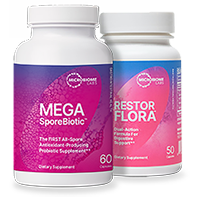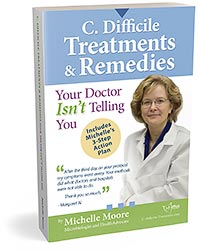Over the last decade, probiotics have become a hugely popular and well known trend in the health and wellness community. The recent popularity of probiotics has led to a daunting array of probiotic products that differ widely in their properties, potency and effectiveness.
This has led to some widely held myths about probiotics, some of which are false, and some which are only partially correct. Below are the six main myths about probiotics and what you need to know about them.

Most doctors have no training or experience with the natural remedies they criticize
The truth is, there are hundreds of scientific studies that prove the benefits of probiotics, and dozens of studies showing the benefits of Bacillus probiotics. And there are thousands of holistic doctors in the U.S. who prescribe probiotics with great success.
There are three main reasons that many doctors are ignorant of the benefits of probiotics, as detailed below:
- Most medical doctors receive little to no training on probiotics or any alternative therapies. And few doctors have the time or interest to do their own research and learn more about alternatives.
- Mainstream medical doctors are under strong financial and legal pressures to avoid alternative remedies and only prescribe “standard protocol” treatments. This pressure comes from the American Medical Association, drug companies, the FDA, hospitals and insurance companies, which are strongly biased against alternatives.
- Some doctors are simply better than others. A good doctor will support your use of probiotics and will monitor your progress while you use them. A good doctor will also be open to unfamiliar treatments, especially when provided with the scientific proof backing such treatments.
While Michelle never tells people to ignore their doctor’s advice, it’s always a good idea to ask how much knowledge, training and experience your doctor has with any remedy they either recommend or discourage. It’s also important to find a better doctor if your current doctor is not giving you the support or providing the results you need. And it’s important to adopt a proactive, informed and confident role in your own healthcare and be willing to question things, rather then blindly following anything a doctor tells you.
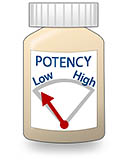
Most probiotics provide minimal benefit to your gut microbiome because they contain ineffective species with poor stability.
If a probiotic cannot survive room temperature without falling to pieces, then how will it survive in your 98-degree body, much less make it through your harsh digestive tract?
Short answer: It won’t. Most popular probiotics arrive in your intestines with only 10% or less of their original potency listed on the bottle label1.
To maximize the true potency of a probiotic, look for a product that maintains stability at higher temperatures. Bacillus spore probiotics are heat stable up to 400 degrees and also survive the acid inside your stomach arriving at 100% potency in your intestine.

Amazon has become the number one target for supplement and probiotic fraud on the internet
If you buy from Amazon, be sure you’re buying from an authorized seller of the products. The best way to make sure is to contact the manufacturer directly and ask them which sellers on Amazon, if any, are authorized and legitimate.
Microbiome Labs, the manufacturer of MegaSporeBiotic does not sell their products on Amazon, nor do they authorize any sellers on Amazon. Many unsuspecting Amazon customers believe they are ordering directly from Microbiome Labs, but they are purchasing from fraudulent sellers. According to reviews, many buyers have received ineffective and fake MegaSporeBiotic.
Our company Embrace Health has been an authorized seller for Microbiome Labs since 2017. So when you order through our online store at EmbraceHealthNaturals.com, you receive genuine Microbiome Labs products. And you get the lowest pricing on these products, plus personalized support in how to use them specifically for gut infection support.

Fermented foods can be healthy, but not because of their probiotic content
Also, many of these so-called healthy foods are loaded with added sugar. Sugar feeds disease-causing bacteria in your gut and weakens your immune system, negating any of the benefits of the probiotics in these foods.
Fermented food is good for the microbiome as a prebiotic, but such foods do not deliver significant amounts of live bacteria to your intestines. Fermented foods also do not create lasting change in the gut. Since prebiotics are none-selective, they will feed both good and bad bacteria. If you suspect that you might have a gut infection, it’s much more useful to take a powerful probiotic that can control intestinal pathogens before introducing fermented foods to your diet.
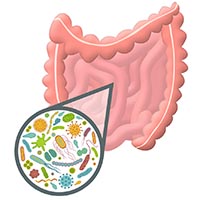
The labeled potency of a probiotic is completely different from the potency that reaches your intestines
There is no scientific evidence to suggest that the health benefits of probiotics are dose-dependent. Having 50 billion CFUs in your probiotic is only helpful if you can confirm that 50 billion are surviving digestion. But survivability studies with some of the leading brands indicate that 90 to 99% of the material cells in these products cannot survive digestion. This means that most people are paying for products with less than 1% survivability. It’s no wonder that most people find probiotics ineffective!
Probiotics are alive. The word Pro-bio-tic literally means pertaining to the support of life. But if the probiotics are not a in the form of a protective spore, then the unprotected probiotic bacteria will not survive well through the stomach.
Most probiotics that you’ll find in the store contain some combination of Lactobacillus or Bifidobacteria. While these are some of the good bacteria that reside in your gut, they are also very poor survivors and gut colonizers. Companies have tried increasing their dosages 10 fold or more, protecting the probiotics inside enteric-coated capsules, and storing the probiotics in cooler temperatures to improve survivability. But the end result is the same: dead probiotics.
But the “New-generation” of probiotics are made from Bacillus spores, and they have a plethora of health enhancements beyond the old probiotics.
- First, Bacillus probiotic actually survive the trip through the stomach into your intestines, because they are spores.
- Second, Michelle’s recommended strains of Bacillus have been proven to provide targeted support against C. difficile and other disease-causing gut bacteria.
- Bacillus spore probiotics can help reduce LPS (or gut endotoxins) from getting into your body (via leaky gut) and thus lower inflammation in the body.
- Bacillus probiotics can support the growth of health promoting species in the gut like Bifidobacteria, Akkermansia and Lactobacillus, just to name a few.
- Bacillus probiotic produce antioxidants, B-vitamins, Vitamin K2 and CoQ10 inside the gut.
- MegaSporeBiotic, our favorite spore-based probiotic, has been shown in clinical studies to reduce Leaky Gut, improve insulin responses and help reduce chronic immune activation.
Learn more about Michelle’s favorite, revolutionary probiotics here: The Best Probiotic Therapies for C. Difficile.

About the Author – Michelle Moore, BSc
Michelle Moore is a microbiologist, holistic health educator, and author of C. difficile Treatments & Remedies. With over 10 years of experience in pharmaceutical research and over 20 years in natural medicine, she helps people overcome C. difficile and other chronic infections naturally.
References
- The Food Standards Agency conducted a study in conjunction with Reading University (Dr. G.R.Gibson, Dr. G. Rouzaud, Dr. J. Brostoff and Dr. N. Rayment) in the United Kingdom to evaluate the probiotic effect of commercial products in the human gut, and whether there was any impact on gut flora. The study evaluated the survivability of common probiotics through the gut, examining 35 strains from commercial products, primarily Lactobacillus sp. and Bifidobacterium sp.

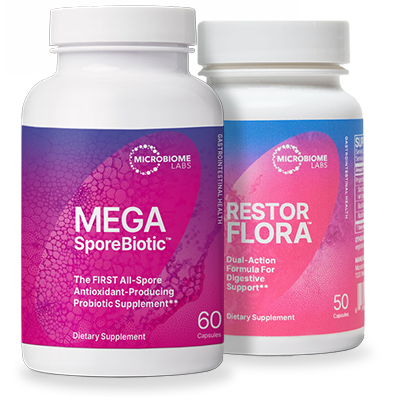

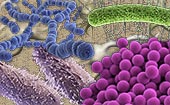
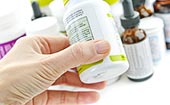

 Fill in the form below to get our C. diff. tips newsletter and your free report “10 Things You Need to Know to Overcome C. difficile”.
We value your Privacy. Your email will be kept strictly confidential & secured. See our
Fill in the form below to get our C. diff. tips newsletter and your free report “10 Things You Need to Know to Overcome C. difficile”.
We value your Privacy. Your email will be kept strictly confidential & secured. See our 